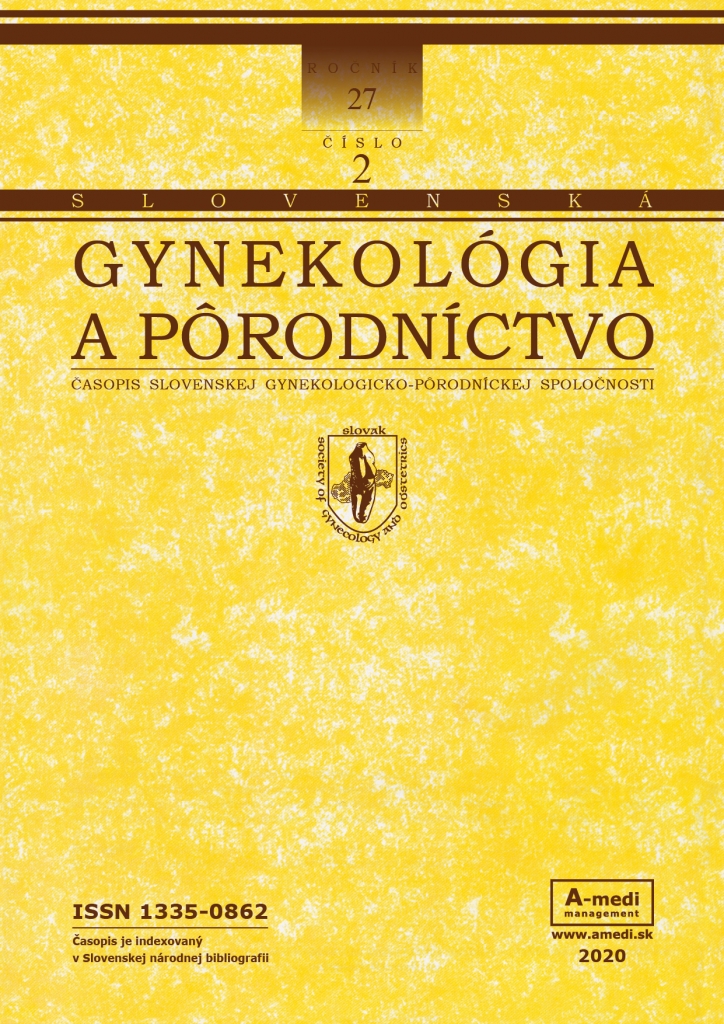
Slovak Gynecology and Obstetrics
- Článok
- Obsah 3/2017
- Archív
- Voľne dostupné články
- Redakčná rada
- Pokyny pre autorov
- Autodidaktické testy
Téma:
THE IMPACT OF CEASAREAN SECTION ON NEWBORNS
L. Dočekalová, Z. Pažická, K. Maťašová
Surgical delivery using Caesarean section has an increasing tendency worldwide.
Its benefits are apparent in case of adverse health and life-threating circumstances
for a mother or child. Nowadays, there is an increasing rate of elective C-sections on
request of the mother. Multiple studies have shown that Caesarean delivery without
appropriate medical indication is connected either with modified mechanisms of
postnatal adaptation or adverse long-term outcomes due to a negative influence on
the development of the child. The absence of stress is of great importance in this process
due to which respiratory, cardiovascular and immune systems, thermoregulation
and metabolism are altered. The gut microbiome, which is of lower diversity and
represented by different bacterial groups, makes children born by C-section more
susceptible to obesity, asthma, allergic and autoimmune diseases or altered functioning
of the central nervous system. These potential risks should be taken into account
during decision-making about mode of en_delivery.
Ročník 2017 Témy časopisu Slovak Gynecology and Obstetrics 3 / 2017
doc. MUDr. Martin Redecha, PhD.
EDITORIAL BOARD
prof. MUDr. Miroslav Borovský, CSc.
prof. MUDr. Ján Danko, CSc.
prof. MUDr. Karol Holomáň, CSc.
MUDr. Ľudovít Janek
prof. MUDr. Štefan Lukačín, PhD.
prof. MUDr. Miloš Mlynček, CSc.
prof. MUDr. Ján Štencl, CSc.
doc. MUDr. Ivan Hollý, CSc.
doc. MUDr. Miroslav Korbeľ, CSc.
doc. MUDr. Jozef Višňovský, PhD.
doc. MUDr. Pavol Žúbor, DrSc.
doc. MUDr. Igor Rusňák, PhD.
MUDr. Jozef Adam
MUDr. Tibor Bielik, PhD.
PUBLISHER
Slovenská gynekologicko-pôrodnícka spoločnosť
Adresa: Antolská 11, 851 07 Bratislava
IČO 31802800, DIČ 2021515243
telefón-fax: 02/68 67 2 725
e-mail: slovenskagynekologia@gmail.com
EDITORIAL OFFICE OF JOURNAL
A-medi management, s. r. o.
Kupeckého 3,821 08 Bratislava
IČO: 44057717
telefón-fax: 02/55 64 72 47
e-mail: amedi@amedi.sk, www.amedi.sk
EDITOR-IN-CHIEF
Ing. Danica Paulenová
e-mail: paulenova@amedi.sk
GRAPHIC LAYOUT AND TYPESETTING
Lucia Vecseiová
e-mail: dtp@amedi.sk
MARKETING MANAGER
Ing. Dana Lakotová
mobil: 0903 224 625
e-mail: marketing@amedi.sk
LANGUAGE PROOFREADING
Mgr. Eva Doktorová
PROOFREADING OF ENGLISH TEXTS
Mgr. Jana Bábelová
ECONOMY AND SUBSCRIPTIONS
Ing. Mária Štecková
telefón: 02/55 64 72 48
mobil: 0911 117 949
e-mail: ekonom@amedi.sk

